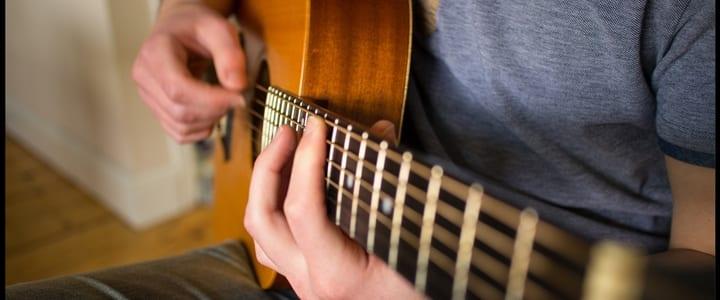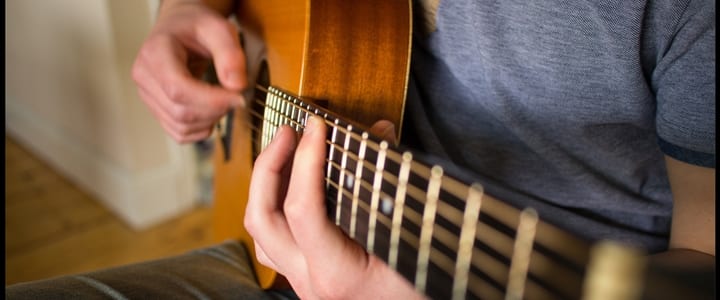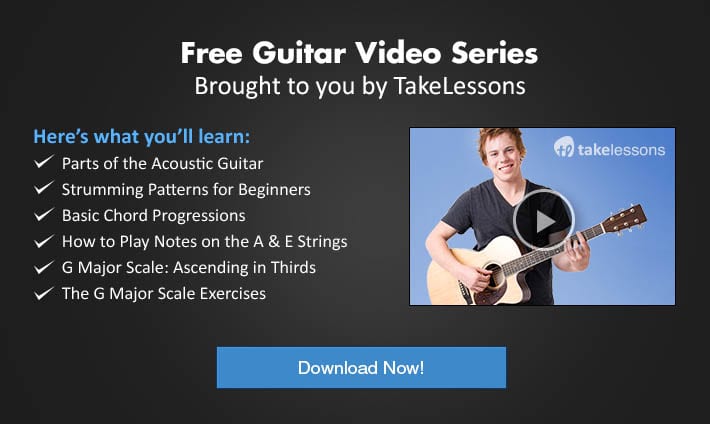Looking for the best beginner acoustic guitar to purchase? Read on for some helpful advice from Perth Amboy, NJ guitar teacher Jeff S...
Selecting the right guitar teacher for you or your children is certainly a crucial decision and the choice you make can often dictate how well the lessons will go.
Yet an often overlooked (and quite frankly, often-botched) step that needs to be carefully addressed before lessons begin is selecting the right size and type of beginner acoustic guitar for your child’s age, body and hand size, and musical inclinations.
See Also: 9 Best Acoustic Guitars for Kids
I would estimate that 60% of my students (or their parents) buy the wrong size or type guitar. And this invariably puts me in the awkward and unenviable position of eventually being the bearer of bad news. And while I never push my students or their parents toward purchasing another guitar, I’m often asked for my input on this subject. So in an effort to be helpful and to point them in the right directions, I have compiled a list of some guitar makes and models that are size-friendly, are reasonably easy to play, and are cost-efficient for most budgets. I have recommendations for acoustic guitars under $500.00 as well as acoustic guitars between $500.00 and $1,000.00, which I will share with you in part two of this article, but first let me offer details on what I consider “the wrong guitar.”
When I speak to a new student’s parent and they tell me they bought a “guitar package deal” at a warehouse or club wholesale store, I have to hold back a wince. Not necessarily because of a lack of quality of merchandise sold there, but because typically there’s a very large-sized guitar featured in these bundles or packages (which can include a small amp, tuner, cable, picks, etc.). But the sad reality is that most children and even some teens and adults will be challenged to comfortably wrap their arms around them and be able to reach the sound hole of the instrument (where they need to place their right hand to strum the strings).
The name of this type of guitar is dreadnaught (and in my mind, the prefix “dread” is quite apropos). And dreadnaughts, along with jumbo-sized guitars, are the largest, widest-bodied acoustic guitars on the market. When a child attempts to hold them (especially a small child), it feels and looks about as natural as if they were holding a St. Bernard dog on their lap. So I would generally steer you away from dreadnaughts and jumbo-sized guitars, no matter how sweet a deal you find at the club and warehouse stores, In fact, even if Uncle Jimmy offers to loan or give one to you for your kid, I’d say thanks, but no. The only possible exceptions to my admonitions against larger-bodied guitars would be for taller or larger teens and adults. Then the dreadnaughts and jumbos are worth looking into for their big sounds and great values.
I would also steer clear of nylon string (aka classical) guitars unless your child or you are interested in learning classical guitar music, flamenco, or the like. The reason I say this is because the necks on classicals are significantly wider than steel string acoustics, and they’re almost always highly lacquered (making them prone to stickiness and therefore quite difficult to maneuver on). The nylon strings can also be more difficult to grip than steel strings for many students.
So what size and type of guitars would I recommend? How do you find the best beginner acoustic guitar? My suggestions would be: folk size, 3/4 size, orchestra size, mini-jumbo size, and travel size.
See Also: Best Acoustic Guitar Reviews
All of these body shapes and sizes are nowhere near as wide as dreadnaughts and jumbos, so students (of just about every size) feel much more comfortable holding them. The trick is finding them, because strangely enough these ginormous-sized dreadnaughts tend to be the most common in music stores and are often less expensive than their smaller-bodied counterparts. Strange, huh?
Want more specific recommendations? Here’s my list of the best acoustic guitars under $500 — check out the list, play the instruments in the store and compare them carefully, consult a knowledgeable salesperson if you can find one at the store, and buy cautiously (and hopefully at a store or online seller with a lenient return policy). But my closing mantra would be: “Less is more.”
Happy selecting and strumming!
Jeff S. teaches guitar, ukulele, speaking voice, songwriting and more in Perth Amboy, NJ, as well as online. Jeff has created and taught songwriting and music business classes at colleges, universities, and music schools throughout the country for many years. Learn more about Jeff here!
Photo by murray
Suzy S.



